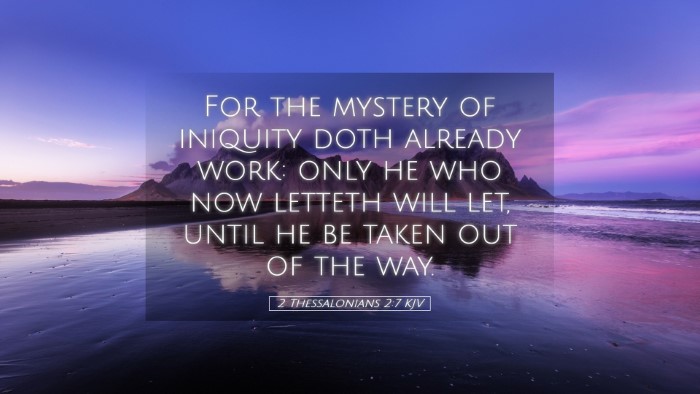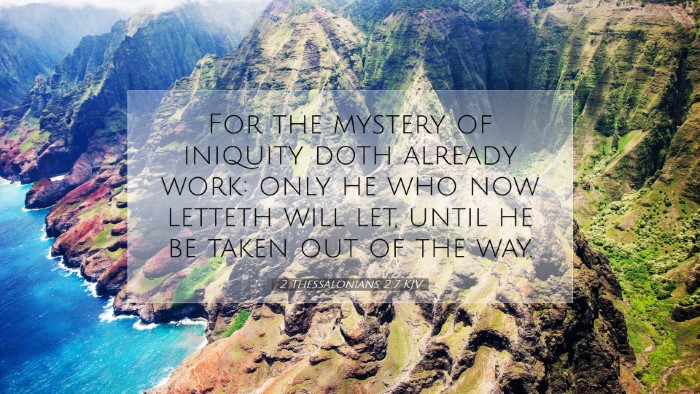Commentary on 2 Thessalonians 2:7
Verse: "For the mystery of iniquity doth already work: only he who now letteth will let, until he be taken out of the way." (2 Thessalonians 2:7)
Introduction
In this verse, the Apostle Paul addresses the concern of the Thessalonian church regarding the coming of the Lord and the revealing of the man of sin. His message encapsulates profound theological insights into the nature of evil and divine restraint.
The Mystery of Iniquity
Albert Barnes comments that the term "mystery of iniquity" denotes a hidden force or principle of lawlessness that was already at work at the time of Paul's writing. Evil, he asserts, manifests itself in subtle forms, often hidden from immediate sight. This concept implies that there are spiritual forces at play that escalate in activity as the return of Christ draws near.
Adam Clarke stresses that this mystery is not to be confused with open rebellion against God but rather refers to a gradual development of sin that is intricately woven into society. He elaborates that this iniquity speaks to the systematic nature of opposition against divine laws and principles, which fosters disbelief and moral decay.
The Role of Restraint
The latter part of the verse introduces the role of restraint, stating that "only he who now letteth will let." The phrasing indicates a holding back or preventing force that is crucial in maintaining divine order until the appointed time.
Matthew Henry posits that this restrainer could refer to the Holy Spirit's influence on the church. He argues that as long as the church exists on earth, it serves as a moral compass, preventing sin from reaching its full potential. Once this restraining power is removed, the culmination of iniquity will unfold, leading to more significant chaos and rebellion against God.
Albert Barnes adds that this restraining force may also allude to civil authority, which God employs to uphold justice and moral structure within society. Police, government, and laws are thus seen as God's instruments to counteract the proliferation of lawlessness.
Until He Be Taken Out of the Way
This phrase suggests a future moment when the restrainer will be removed, allowing iniquity to prevail. This period is often interpreted as the time of the end, when the Antichrist's emergence is anticipated, leading to tribulation for believers.
Matthew Henry emphasizes that this eventual removal will trigger an absence of spiritual and moral restraint, ushering in a time of trials and darkness that will precede the Second Coming of Christ.
Adam Clarke provides a vivid description of this future scenario, indicating that once this restraining influence is withdrawn, humanity will be exposed to a heightening of natural wickedness which will culminate in the rise of the man of sin.
Theological Implications
The implications of 2 Thessalonians 2:7 stretch beyond the immediate context of the Thessalonian church. It serves as a timeless reminder of the battle between good and evil. The "mystery of iniquity" signifies that forces of evil are active in the world, even when not visibly apparent to us.
- Spiritual Awareness: Believers are reminded to be vigilant and aware of the pervasive nature of sin and its manifestations in society.
- Role of the Holy Spirit: Understanding the importance of the Holy Spirit as the restrainer illuminates the need for the church to remain engaged in proclaiming the gospel and living out the truth.
- Hope in Divine Order: Even in the face of rampant evil, believers can find comfort in the assurance that God is sovereign and will ultimately establish His kingdom.
Conclusion
2 Thessalonians 2:7 offers rich theological insights that challenge believers to reflect on their spiritual vigilance amidst the lurking forces of iniquity. Through the coordinates of divine restraint and the anticipation of the ultimate return of Christ, Paul invites the church to maintain faith and hope while navigating a world fraught with moral challenges.


